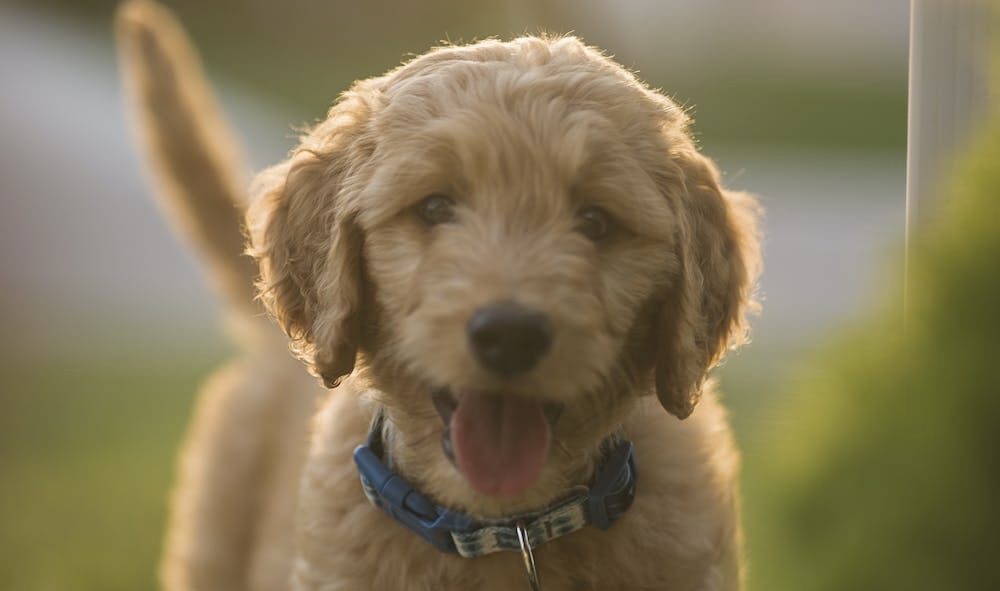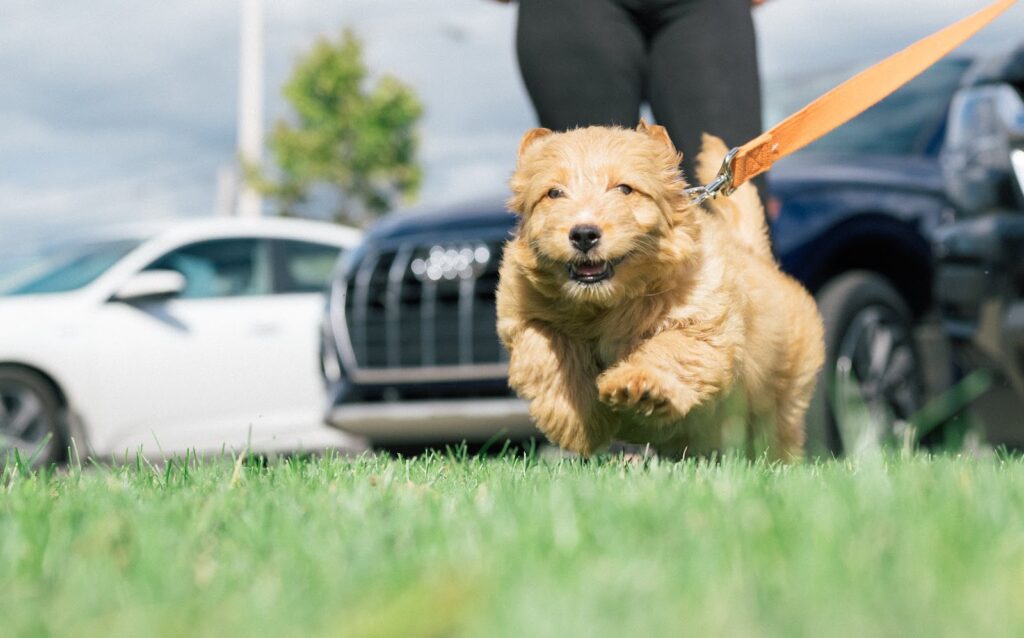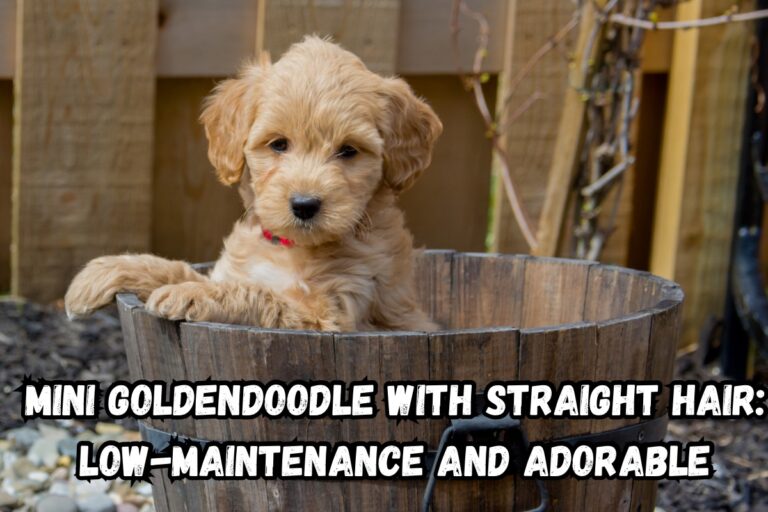
In the world of designer dogs, the Mini Goldendoodle with straight hair stands out as a petite package of joy and a testament to the wonders of thoughtful breeding.
This delightful breed combines the intelligence and hypoallergenic qualities of the Poodle with the obedience and affability of the Golden Retriever, all wrapped up in a smaller, manageable size.
But what truly sets the straight-haired Mini Goldendoodle apart is their unique coat type – a rarity among their typically curly or wavy Goldendoodle counterparts.
Read on to know all about the best grooming and maintenance practices for your mini goldendoodle.
Origin and Appearance of Mini Goldendoodles

The Mini Goldendoodle’s journey begins with the desire to create a smaller version of the popular Goldendoodle. The breeding involves carefully selecting and mating smaller Poodles with Golden Retrievers, aiming for a dog that retains the best qualities of both breeds in a more petite form.
The straight hair of some Mini Goldendoodles is a fascinating genetic twist. While most Goldendoodles have wavy or curly coats, the straight-haired variety occurs when the puppy inherits more of the Golden Retriever’s coat traits. This genetic outcome is less predictable and less common, making straight-haired Mini Goldendoodles a unique find.
Mini Goldendoodles typically weigh between 15 to 30 pounds and stand about 13 to 20 inches tall at the shoulder. Their size categorizes them as small to medium dogs, ideal for various lifestyles and environments. Despite their smaller stature, they possess a sturdy build and an agile nature, reflecting their playful and energetic personality.
The straight coat of a Mini Goldendoodle is reminiscent of the Golden Retriever’s but often with a slightly looser texture and less shedding. This coat type is relatively low maintenance compared to their curly counterparts, requiring regular brushing to keep it smooth and free of tangles.
Bathing every couple of months, coupled with occasional trims, generally suffices to keep their coat healthy and neat. The straight-haired variety can still be hypoallergenic, though this can vary individually, making them a potentially suitable option for allergy sufferers.
Personality and Temperament

The Mini Goldendoodle is often described as a ‘joyous jester’, embodying a blend of cheerfulness and affection that is irresistible. These dogs are the epitome of playfulness, often displaying puppy-like exuberance well into their adult years. They revel in play, whether it’s a game of fetch or a fun training session.
Their affectionate nature is equally prominent, making them excellent cuddle companions. Mini Goldendoodles are known for their ability to form strong emotional bonds with their owners, often becoming deeply attached and displaying a high level of empathy towards human emotions.
In terms of social dynamics, Mini Goldendoodles are stars. They typically get along splendidly with all members of the family, from young children to the elderly, adapting their behavior to suit each individual. This breed is also generally good with other pets, showing a friendly and non-aggressive demeanor towards other dogs and even cats.
Health and Aftercare
While Mini Goldendoodles are generally healthy, they can inherit health issues common to their parent breeds. Potential concerns include hip dysplasia, a condition affecting the hip joint, and eye disorders like progressive retinal atrophy. Ear infections can also be common due to their floppy ears, which can trap moisture and debris.
Preventive healthcare is crucial in maintaining the well-being of a Mini Goldendoodle. Regular veterinary check-ups, vaccinations, and parasite control are essential.
Maintaining good dental hygiene, with regular brushing and professional cleanings, is also important. A proactive approach to their health, including awareness of any changes in behavior or physical condition, can help in early detection and treatment of potential health issues.
Nutritional Know-How: Feeding Your Mini Goldendoodle

The dietary needs of Mini Goldendoodles change as they transition from puppyhood to adulthood and into their senior years. Puppies require a diet rich in protein and essential nutrients to support their rapid growth and development.
It’s important to feed them puppy-formulated food that caters to their size and energy levels. As they mature into adults, their dietary needs shift towards maintaining optimal weight and health.
A balanced diet with the right proportions of protein, carbohydrates, and fats is crucial.
For senior Mini Goldendoodles, dietary adjustments may be necessary to accommodate slower metabolisms and potential health issues. Lower-calorie diets and foods that support joint health can be beneficial.
Treats are an important tool in training and bonding but should be given in moderation. Healthy treat options can include fruits and vegetables that are safe for dogs, like carrots and apples.
However, it’s important to avoid foods that are toxic to dogs, such as chocolate, grapes, onions, and foods containing xylitol. Monitoring treat intake is essential to prevent obesity, a common issue in domestic dogs.
Training Basics: Educating Your Mini Goldendoodle
Training a Mini Goldendoodle is an enjoyable and rewarding experience due to their intelligence, eagerness to please, and affectionate nature. Here are some unique and effective training methods that work best for this breed:
- Start Early and Stay Consistent: Begin training your Mini Goldendoodle as early as possible. Puppies are more adaptable and open to learning. Consistency is key; use the same commands and rewards to create a reliable routine.
- Positive Reinforcement: This breed thrives on positive reinforcement. Use treats, praise, and play as rewards for good behavior. This not only reinforces the behavior but also strengthens your bond.
- Socialization Training: Expose your Mini Goldendoodle to various environments, people, and other pets from a young age. This builds their confidence and social skills, reducing anxiety and fearfulness in new situations.
- Clicker Training: A clicker can be a highly effective tool. It creates a clear, distinct sound that marks the exact moment your dog does something correctly, followed by a reward. This method helps your dog understand exactly what behavior is being rewarded.
- Puzzle Toys and Games: Utilize puzzle toys to stimulate their minds. These games keep training sessions fun and engaging, and help in developing their problem-solving skills.
- Obedience Training: Basic obedience commands like ‘sit’, ‘stay’, ‘come’, and ‘heel’ are crucial. These commands not only improve their behavior but also ensure their safety.
- Leash Training: Start leash training early. Use a harness to avoid strain on their neck and back, and keep initial walks short and enjoyable.
- Agility Training: Mini Goldendoodles often excel in agility training. This not only provides physical exercise but also mental stimulation, enhancing their agility and obedience.
- Crate Training: Crate training is beneficial for creating a safe space for your dog and for housebreaking. Make the crate a positive, comfortable environment with treats and toys.
- Patience and Adaptability: Every dog is different. Be patient and willing to adapt your training methods to suit your Goldendoodle’s personality and learning style.
Grooming Guide: Schedule, Tips, Hacks, and Recommendations
- Regular Brushing: Brush your Mini Goldendoodle’s coat 2-3 times a week to prevent matting and tangles. For straight-haired varieties, a slicker brush or a metal comb works well.
- Bathing Schedule: Bathe your Goldendoodle every 4-6 weeks. Overbathing can strip natural oils, so it’s essential to use a gentle, dog-specific shampoo.
- Ear Care: Check and clean their ears weekly, especially after bathing or swimming, to prevent infections.
- Nail Trimming: Trim nails every 3-4 weeks. If you hear their nails clicking on the floor, it’s time for a trim.
- Dental Hygiene: Brush their teeth regularly with dog-specific toothpaste to maintain oral health.
- Professional Grooming: Schedule professional grooming sessions every 6-8 weeks for a thorough grooming and to maintain the shape of their coat.
Products and Practices:
- Detangling Spray: Use a detangling spray during brushing to ease out knots and protect the coat.
- High-Quality Shampoo: Invest in a high-quality, mild shampoo that’s suited for dogs with sensitive skin.
- Cotton Balls for Ear Cleaning: Use cotton balls dampened with a vet-approved ear cleaner.
- Dog-Specific Toothbrush and Toothpaste: Ensure oral hygiene with products made specifically for dogs.
Following this grooming schedule and using recommended practices will help keep your Mini Goldendoodle looking and feeling their best. Remember, regular grooming is not only about maintaining their appearance but also about their overall health and well-being.
Conclusion
As we conclude our comprehensive guide on the Mini Goldendoodle with straight hair, it’s evident that these little bundles of joy are not just a furry companion, but a heartwarming addition to any home. With their unique straight coats, endearing personalities, and adaptable sizes, they fit perfectly into various lifestyles, bringing cheer and affection wherever they go.
Embracing life with a Mini Goldendoodle means embarking on an adventure filled with playful antics, loving cuddles, and an unbreakable bond. Their low-maintenance grooming needs, combined with their eagerness to learn and please, make them an ideal choice for first-time dog owners and experienced pet lovers alike. Their sociability and gentle nature make them excellent companions for children and seniors, creating a harmonious environment for the entire family.
Remember, the journey with your Mini Goldendoodle is not just about caring for them; it’s about the mutual love and joy you’ll share. Every wagging tail, every playful bark, and every affectionate nuzzle is a reminder of the delightful choice you’ve made in bringing a Mini Goldendoodle into your life.

